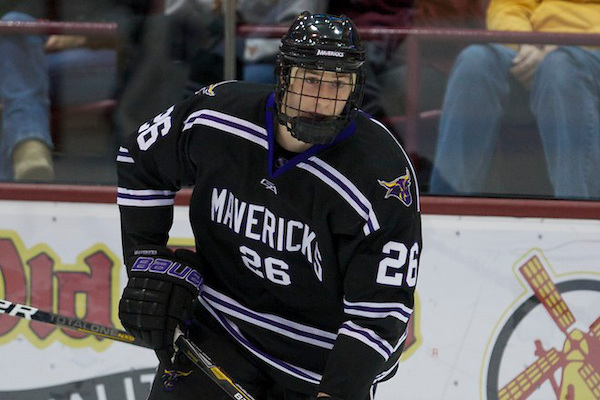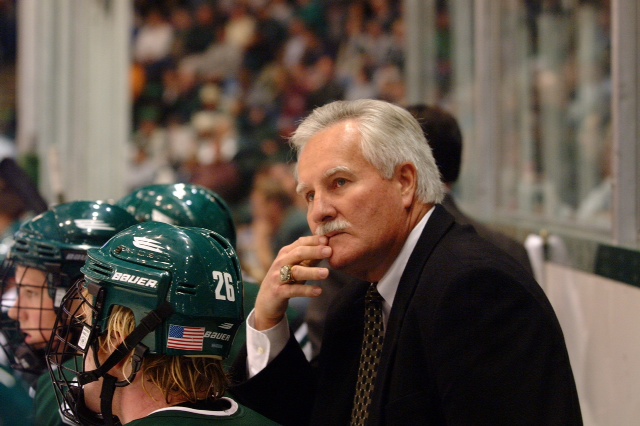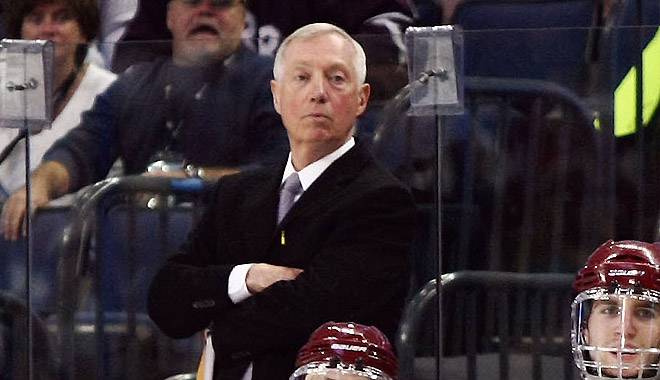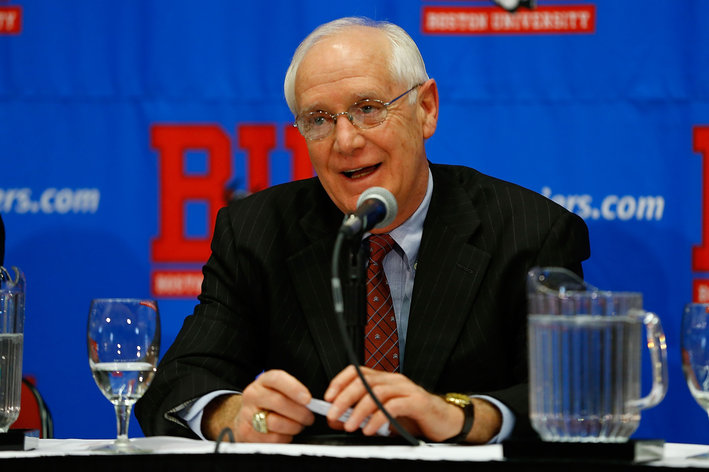You probably recognize at least one of these names, and they are names in college hockey news this year — more on that later in today’s article.

Last weekend only a few top twenty teams swept opponents, while most had some level of difficulty on the weekend. Starting with our heralded matchups from last week, #4 North Dakota had a tough time with #10 Mankato State Friday night as the second period ended tied, 2-2. In the third, North Dakota took the lead 3-2 six minutes in and put the clampers on for the next thirteen minutes, holding Mankato scoreless. Mankato added an extra attacker with a minute to go, but North Dakota found the empty net to go up 4-2. Mankato managed a goal fifteen seconds later for the final score of 4-3, North Dakota. Saturday night North Dakota scored right off the bat, a minute into the first, and the game stalemated for thirty-eight minutes, until Mankato’s Dylan Margonari scored with time running out in the second, to tie it at 1-1. The game went to OT, and Mankato’s Brett Knowles scored the game winner three minutes in, the final, 2-1 Manakato State. In Friday night’s game, Mankato got forty shots off, to twenty for North Dakota. Satuday night’s game also featured tons of offensive opportunities as Mankato took 37 shots and North Dakota took 31. #6 UMass-Lowell split with #17 Providence, with each team getting a convincing win; this split was enough for UMass-Lowell to capture the regular season championship in Hockey East. #8 St. Cloud State travelled to #14 Wisconsin, knowing that if they were able to sweep Wisconsin, they would win the WCHA regular season title outright. Friday night went St. Cloud’s way, despite being behind after the first 1-0, and after the second 2-1. In the third, St. Cloud scored early and late, to tie, and take then take the lead at 3-2. Wisconsin added an extra attacker, and St. Cloud found the empty net right away to make it 4-2 for the final score. Saturday night Wisconsin took the lead 2-1 twelve minutes into the first, and that score stood for forty-seven minutes, until St. Cloud added an extra attacker, but Wisconsin found the empty net to make it 3-1. With half-a-minute to go, St. Cloud scored an extra-attacker goal for the final score of 3-2, Wisconsin. On the split, St. Cloud State became WCHA regular-season co-champions with #2 Minnesota, as the Golden Railway Money Diggers swept Bemidji State on the weekend.
Elsewhere, #5 Boston College tied and beat Vermont, and New Hampshire tumbled from the #4 to the #7 ranking on its loss to, and tie with, Maine. Neither of these two exactly lit the world on fire in the second half of the season, but New Hampshire seemed to have more trouble than BC as the season progressed. #11 Denver swept Alaska-Anchorage, #18 Boston University swept Northeastern, and Nebraska-Omaha tumbled from the #16 ranking to the #20 ranking after being swept by Minnesota-Duluth. #1 Quinnipiac, #3 Miami of Ohio, #9 Western Michigan, #12 Notre Dame, #13 Yale, #15 Niagra, #16 RPI, and #19 Union were all idle as they all had byes in their respective CCHA, ECAC, or Atlantic Hockey tournaments.
This weekend presents a boat-load of games as all five conferences are full-tilt in their tournaments, with all matchups a best two-of-three series. In Atlantic Hockey, #15 Niagra hosts RIT, #24 Air Force hosts Canisius, Holy Cross hosts Mercyhurst, and Connecticut hosts #25 Robert Morris. In the CCHA, #3 Miami hosts Michigan State, #9 Western Michigan hosts Michigan, #12 Notre Dame hosts Bowling Green, and Ohio State hosts Ferris State. In the ECAC, #1 Quinnipiac hosts Cornell, #13 Yale hosts #22 St. Lawrence, #16 RPI hosts Brown, and #19 Union hosts #21 Dartmouth.
In Hockey East, #5 Boston College hosts Vermont (Vermont just tied BC last weekend), #6 UMass-Lowell hosts Maine, #7 New Hampshire hosts #17 Providence, and #18 Boston University hosts #23 Merrimack. In the WCHA, #2 Minnesota hosts Bemidji State, #4 North Dakota hosts Michigan Tech, #8 St. Cloud State hosts Alaska-Anchorage, #10 Mankato State hosts #20 Nebraska-Omaha, and #14 Wisconsin hosts Minnesota-Duluth.
So who are York, Mason, and Parker? You may have heard the story of Jerry York and Jack Parker playing against each other in high school in Boston, against each other in college in Boston, and now coaching against each other in Boston. This year Jerry York passed Ron Mason and became the winningest coach in college history. And the story of Jerry York and Jack Parker playing against each other and coaching against each other since 1959 now comes to an end, as the #3 winningest coach in college history, Jack Parker, has retired from Boston University, effective with the last game Boston University will play this season. I was going to write about Jerry York’s milestone at the very end of the season, but it seems it’s time to do it now.

Here’s where Ron Mason comes in. Ron Mason played at St. Lawrence, graduating in 1964, and was for a very long time the winningest coach in college hockey history, having won 924 games when he retired from Michigan State in 2002. This season, on December 29, 2012, Jerry York became the winningest coach of all time when Boston College beat Alabama-Huntsville, giving York win #925; Boston College has won another eight games since then, making York’s total 933 wins to date. Ron Mason coached for seven years at Lake Superior State, six years at Bowling Green, and 23 years at Michigan State, for a total of 36 years. When Mason left Bowling Green, he was replaced by . . . . Jerry York. York played at Boston College, graduating in 1967, and coached for seven years at Clarkson, fifteen years at Bowling Green, and is already in his nineteenth season at BC, for a total of 41 years. Jack Parker played at Boston University, graduating in 1968, and and has coached at BU for forty years.
I thought it would be fun to compare the results of what these guys did while coaching. Lets start with Ron Mason — his overall winning percent is .696, and during his 23 years at Michigan State, he had a run of making the NCAA tournament in 19 out of 21 years; during that stretch his teams made five Frozen Fours, two appearances in the championship game, and won a championship. He also had a three year stretch at Bowling Green when his teams made the NCAA tournament, and made the Frozen Four once.

Since Jerry York came to BC, he has had a fifteen year stretch during which his teams have made the NCAA tournament thirteen times, and during this stretch, have made it to ten Frozen Fours, eight appearances in the championship game, and four championships, including three of the last five. In addition, his teams had a nine year stretch at Bowling Green during which they made the NCAA Tournament six times, including one Frozen Four appearance, a championship game appearance, and a championship. He has coached five NCAA championship teams, and his overall winning percentage is .615. Jack Parker has had a streaky existence at BU, but in his thirty nine seasons to date, his teams have made it to the NCAA Tournament 24 times, including 13 Frozen Fours, six appearances in the championship game, and three championships. His overall winning percentage is .643. I am going to attempt to put this into four columns, and hope it comes out fairly well — please forgive me if it’s a mess:
. . . . . . . . . . . . . . . . . . . . Ron Mason Jerry York Jack Parker
- Seasons 36 40 39
- NCAAs 22 19 24
- Frozen 4s 6 11 13
- Title Games 2 9 6
- Championships 1 5 3
Now let’s look at this. Ron Mason’s teams made it to the NCAA Tournament in 61% of his seasons. And they made it to the Frozen Four in 27% of those NCAA appearances. Then one-third of the time they made it that far, they made it to the title game, and of the two title games, one championship, so they converted on 50% of their title game appearances.

Now Jack Parker’s teams have made it to the NCAAs in 61.5% of his seasons, the same as Ron Mason. Parker’s teams then made it to the Frozen Four in 54% of their NCAA appearances, double Mason’s rate, and from there they made it to the championship game 46% of the time, which is about 40% more than Mason’s teams. And they converted on these title chances 50% of the time, same as Mason’s. Parker’s teams came back with a championship about 12.5% of the time they went to the NCAA Tournament, which is nearly triple the rate of Mason’s teams at about 4.5%. I am not trying to diminish Ron Mason’s record in any way, and I believe most any coach would love to have his numbers and accomplishments. I am simply emphasizing some stats. Now, here is the killer. Jerry York’s teams have been to the NCAAs in 47% of his seasons, well behind Mason and Parker’s stat of 61%. York’s teams have made it to the Frozen Four in 58% of their NCAA appearances, dwarfing Mason’s 27%, and a little better than Parker’s 54%. But here is where it gets amazing. York’s teams have made it to the title game 82% of the time they made the Frozen Four, dwarfing both Mason’s 33% and Parker’s 46%. And then York’s teams have converted these title game opportunities to championships 55% of the time, about the same as Mason’s and Parker’s. But the conversion of Frozen Four appearances to Title Game appearances has been so high with York’s teams, that his percentage of NCAA Tournament appearances turning into Champioships is 26%, again dwarfing Mason’s 4.5% and Parker’s 12.5%.
I can hear you now, “Ok, so what?” Ok, so when a Jerry York team comes to the NCAA Tournament, look out! History says they are going to be very, very serious in that tournament. And remember how York’s teams had made the NCAA Tournament considerably less often than Mason’s and Parker’s (47% of the time compared to 61% — only 77% as often as the other two?) Well, regardless of that, guess who has the highest percentage of championshps out of all seasons coached, among the three? Mason has 2.7%, Parker has 7.7%, and Jerry York has 12.5%. Hope it’s obvious that I respect York’s record and accomplishments.
A word about Jack Parker. I was a grad student at BU, arriving in Parker’s 26th season. Don’t I wish. Ok, so I arrived in his sixth season. He was considered hot stuff. He recruited extremely good players. And they won a lot. The year before I arrived, they won the 1978 NCAA Championship. It was the third time for BU in the seventies. Their record in 1978 was 30-2. The team I saw in 1978 to 1979 was amazingly fun to watch, with Jim Craig in the net, and lots of playing time for Jack O’Callahan, Dave Silk, and a couple of others I remember who you might never have heard of, Tony Meagher and Marc Hetnik. It was a great team that unfortunatley knew it, so the 1979 season was pretty up and down. Parker put together an amazing run in the 90s and winning it all in 1995. In the late 90s and early 2000s the team was very up and down from year to year. Apparently some vocal BU fans/folks were hoping to replace Parker, when, seemingly out of nowhere, BU won it all in 2009 with a team that dripped talent on the ice. According to some vocal folks, Parker had little to do with that season, the assistant coaches having done the recruiting, and most of the coaching by that point. I don’t know if that is true or not. In the last couple of years a small number of BU hockey players have disgraced the reputation of a truly historic college hockey program, and during this time some vocal folks have called for Parker to resign/retire, citing Parker as having lost control of the team members. I think I can stand the idea of criticsim of people I think have done a good job. No one is perfect. But to those out there who say Parker had little to do with the 2009 Championship, but is the cause of the player misconduct both on and off the ice these past couple of years, I say, give me a break. It’s one or the other, and no, you can not have it both ways. Either the guy checked out in the early 2000s and the team was run by the assistants, winning the ’09 championship, making them responsible for the mess in the last couple of years, or else Parker was running the team in ’09 and won that championship, and then, I suppose, roads to lead to his lack of leadership and discipline on team members these last couple of years. But don’t tell me that the assistants ran the championship team in ’09, and somehow were not running the team from 2011-13. Nothing lasts forever, and it could well be time for a change at BU. But don’t be a bozo, be fair about it.
This provides the top twenty teams, rankings, records, and last weekend’s results:
[table id=64 /]
That’s all for now. Stay tuned, and go Terriers!
— Tom
Leave a Reply
You must be logged in to post a comment.